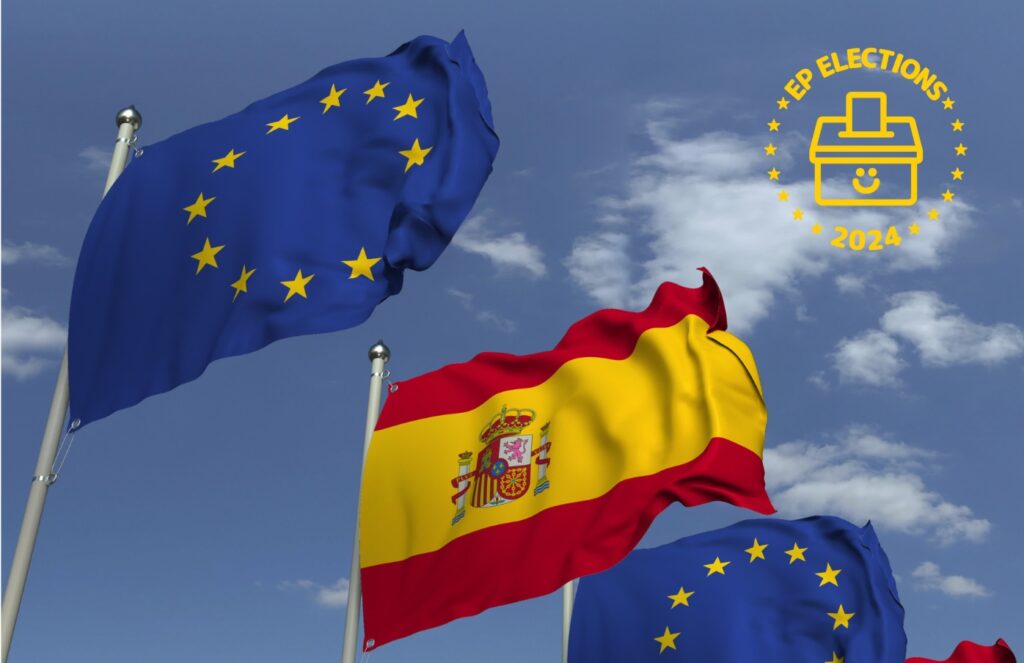
The upcoming European elections will serve to measure the balance of power within a left that is divided into two lists: On one side, the Sumar coalition, which is part of the central government and is experiencing electoral and internal difficulties; and, on the other, Podemos, which emerged in which emerged to contend in the European elections exactly ten years ago.
In less than one month (on Sunday, 9 June), the European elections will be held in Spain. This electoral event can be analysed in its three key dimensions: European politics, the internal dynamics of Spanish politics, and the intricate disputes within the left-wing sphere.
In the realm of European politics, the elections occur amidst an evident trend toward conservative ideologies across the continent. Several far-right parties in countries such as Italy, France, the Netherlands, and others are poised to potentially emerge as dominant political forces. The growing discourse advocating heightened defense spending spurred by Russia’s actions in Ukraine and the prospect of Donald Trump’s potential return to the White House, further reinforces this rightward shift.
Spain is currently one of the few countries in the European Union that retains a progressive government (a coalition between socialists and the left). Therefore, if the conservatives of the People’s Party should achieve a victory by a wide margin this would have Europe-wide significance in sealing the general rightward trend, but if the parties of the governing coalition achieve good results this will deepen the image of the country as a bastion of resistance against conservative forces at the continental level (if the parties of the governing coalition achieve good results).
Regarding Spain’s internal politics, the elections are another stage in the ongoing battle between the left-wing bloc (comprising the Spanish Socialist Workers’ Party – PSOE, which is part of the Group of the Progressive Alliance of Socialists and Democrats – S&D, and the Sumar coalition, which includes parties integrated into The Left Group as well as the Green Group) and the right-wing bloc (composed of the People’s Party-PP, integrated into the European People’s Party-EPP Group, and the far-right Vox, belonging to the European Conservatives and Reformists Group-ECR). After the victory of the left-wing bloc and its nationalist and pro-independence allies in the last legislative elections in July 2023, the right-wing bloc has carried out an opposition by all possible means to the coalition government, viewing every electoral opportunity, whether at the territorial level or otherwise, as a chance to wear down the government.
Finally, the election will also have significant implications in the context of the dispute within the left-wing space in recent months. The recently formed Sumar coalition had to face the departure of one of its main constituent parties last December: Podemos. After months of disputes regarding the composition of the coalition’s political leadership and negotiations for the electoral lists for the legislative elections last July, the five Podemos parliamentarians finally left the Sumar group in parliament, joining the non-attached group. The exit of the parliamentary group has increased the political weakness of Podemos, which saw its institutional representation greatly reduced after the last regional and local elections.
Since this rupture occurred, the conflict between Sumar and Podemos has escalated even further. The recent regional elections in Galicia marked the first electoral clash between both formations, with disastrous results for both (1.9% of the vote for Sumar and 0.3% for Podemos), although it is true that this is a region in which the left has not historically performed very well. The upcoming elections in the Basque Country will also serve to gauge the balance of power between the two formations (with a risk now of both being left out of the regional parliament). But the real battle is set for the European elections, which Podemos has been preparing for many months with the former Minister of Equality, Irene Montero, as its lead candidate. For its part, Sumar has chosen a person relatively unknown to the electorate, the director of the Spanish Refugee Aid Committee (CEAR), Estrella Galán, aiming to make the migration issue its main electoral battleground.
It is important to remember that it was precisely in European Parliament elections of 2014 that Podemos began its journey as a political project. On that occasion, the new political formation founded by Pablo Iglesias just a few months earlier obtained over a million votes and 5 MEPs. Therefore, for Podemos’s present and past electorate the 2024 European elections could also have a certain symbolic emotional component as a rebirth a decade later.
Moreover, Sumar has exhibited many problems in integrating the parties that are part of the coalition into the list for the European elections. Formations like Izquierda Unida complained about the lack of agreement regarding the distribution of positions on the electoral list, as well as the lack of a defined position on whether Sumar parliamentarians will join The Left Group, the Green Group, or each elected MEP will act individually.
***
The polls published so far seem to point to a victory for the right-wing, which could win around 50% of the vote. The People’s Party appears as the leading force (with around 35-40% of the votes) at a substantial ca. 5-10 points ahead of the Socialist Party (with a predicted 30%). It is also true that neither of these two parties has yet designated their top candidates, so there is still room for some unexpected electoral moves. The third position would be for the far-right Vox, which with approximately 10% of the votes would improve on the results it obtained in 2019 (6% of votes), although it would worsen its results compared to the last national elections. In fourth place would be Sumar, with a range between 7 and 10%, hoping at most to equal the results of Unidas Podemos in the 2019 European elections. And the fifth position would be disputed between Podemos and the alliance of nationalist left-wing parties Now Republics (which include formations integrated into The Left Group such as EH Bildu, but also others aligned with the Green Group, such as Esquerra Republicana de Catalunya or the Galician Nationalist Bloc), both with around 3-4% of the vote.
In terms of the attitude of the Spanish population towards the European Union, Spain has historically been a country with a more positive than average view of the EU institutions. During the years of the 2008 economic crisis and austerity policies, the EU’s image was severely damaged, but it has recovered in recent years, especially following the response to the COVID-19 pandemic and the approval of recovery funds. Not even Vox on the far right has at any time openly proposed withdrawal from the Union, as some of their European counterparts have done in the past; it has only advocated for a Union that returns sovereignty to the states in different areas. From the left, criticisms of the European Union in recent months have been more related to its policy towards conflicts such as Ukraine or Palestine, the increase in military spending, or changes in fiscal rules.
The holding of elections in the Basque Country on 21 April, as well as the upcoming Catalan elections on 12 May, will mean that the public debate on the European elections will begin relatively late in Spain. However, some international/European issues have already been in the spotlight for several weeks. For example, the already mentioned criticism, on the part of different left formations, of Europe’s commitment to increase military spending, which has been viewed as part of a bellicose tendency that could lead to a serious conflict. In addition, there is the EU stance on the massacre carried out by Israel in Gaza, which the left consideres inadequate, advocating instead an arms blockade, the severance of diplomatic relations, and the international isolation of Israel.
But despite the significant current weight of international issues in the political debate within Spain, it seems quite likely that national political issues will once again ultimately dominate the European election campaign. The holding of elections just a few weeks before in Catalonia, as well as the implementation of the amnesty law (aimed at Catalan independence politicians who organised the 2017 independence referendum), suggests that the territorial issue will once again be one of the main campaign axes, as has been continuously occurring in Spanish politics in recent years.
Positions will be further defined as the election date approaches, but we can easily forecast that the People’s Party will try to frame the European elections as a plebiscite against President Pedro Sánchez and the coalition government, while Sánchez and the PSOE will likely recover their discourse of stopping the far-right wave that has served them well in the past. With Vox’s current weakness it difficult to imagine it imposing its framework of rejection of “globalism” and “European elites,” while the left will probably focus, as we have said, on defending a Europe of peace against the militarist impulse. This will be conditioned again by the weight that the dispute between Sumar and Podemos ends up having as the campaign progresses. If the electorate feels that these formations are unable to look beyond themselves, it is likely that the voters will end up punishing both. The challenge for the Spanish left in these elections is precisely whether, after a historic decade in which it has achieved its highest levels of institutional power in almost a century, it is able to break out of the self-absorption loop it has been in for some time and presents itself to society with a clear project for the future.
Cover-Photo: Alexey Novikov via Depositphotos.



